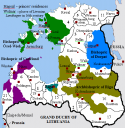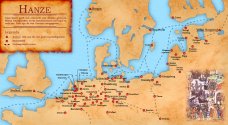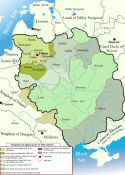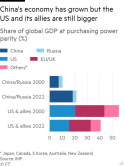You are using an out of date browser. It may not display this or other websites correctly.
You should upgrade or use an alternative browser.
You should upgrade or use an alternative browser.
Miscellaneous News
- Thread starter bd popeye
- Start date
Difficult to believe but Is not an imposible thought if they are looking for a way out by portraying Zelensky as unhinge, they will not "betraying" Ukraine, just Zelensky.
Some quotes from yesterday's Politico report, according to which the Biden administration "quietly preparing" to end proxy war if "Ukraine’s counteroffensive falls short of expectations."
Accordingly, purportedly been high-level talk of selling surrender to Kiev "as a ceasefire" rather than permanent. Perhaps that's the next major psyop - claiming the war isn't over while ending support.
There is belief that Kyiv is willing to consider adjusting its goals, according to American officials, and a more modest aim might be easier to be sold as a win.
There has been discussion, per aides, of framing it to the Ukrainians as a “ceasefire” and not as permanent peace talks, leaving the door open for Ukraine to regain more of its territory at a future date. Incentives would have to be given to Kyiv: perhaps NATO-like security guarantees, economic help from the European Union, more military aid to replenish and bolster Ukraine’s forces, and the like. And aides have expressed hope of re-engaging China to push Putin to the negotiating table as well.
A counteroffensive that doesn’t meet expectations will also cause allies in foreign capitals to question how much more they can spare if Kyiv’s victory looks farther and farther away. European public support may wane over time as European energy and economic costs stay high. Many European nations could also push Kyiv to bring the fighting to an end. A poor counteroffensive will spark further questions about what an outcome to the war will look like, and the extent to which a solution can really be achieved by continuing to send military arms and aid alone.
The president of CFR: "It’s expensive, we’re running low on munitions, we’ve got other contingencies around the world to prepare for." Well quite - like war on China, which RAND in January urged Washington to start preparing for, by laying foundations of withdrawal from Ukraine.
Biden and his top aides have publicly stressed that Zelenskyy should only begin peace talks when he is ready. But Washington has also communicated to Kyiv some political realities: at some point, especially with Republicans in control of the House of Representatives, the pace of U.S. aid will likely slow. Officials in Washington, though not pressing Kyiv, have begun preparing for what those conversations could look like and understand it may be a tough political sell at home for Zelenskyy.
“If Ukraine can’t gain dramatically on the battlefield, the question inevitably arises as to whether it is time for a negotiated stop to the fighting,” said Richard Haass, president of the Council on Foreign Relations. “It’s expensive, we’re running low on munitions, we’ve got other contingencies around the world to prepare for.”
“It’s legitimate to ask all these questions without compromising Ukraine’s goals. It’s simply a question of means,” Haass said.
And here, the kiss of death. Biden has warned Zelenskyy "on dangers of overextending ambitions and spreading troops too thin" - the same warning given to West's puppet president Ghani of Afghanistan. Three months later, he was on a plane to UAE, and has never been heard of since.
U.S. officials have also briefed Ukraine on the dangers of overextending its ambitions and spreading its troops too thin — the same warning Biden gave then-Afghan President Ashraf Ghani as the Taliban moved to sweep across the country during the U.S. military withdrawal in 2021.
But the chances of Ukraine backing down from its highest aspirations is, to say the least, unlikely. “It’s as if this is the only and last opportunity for Ukraine to show that it can win, which of course isn’t true,” said Alina Polyakova, president and CEO of the Center for European Policy Analysis in Washington, D.C.
How can you know he is the sharpest if you know nothing of all the others? You're quick with your insults but not with your wits.
He's definitely sharper than you. Which arguably doesn't take much judging by your activity on this forum.
The idea that Lithuania, Latvia or Estonia are "post-Soviet" states is not offensive but idiotic. Maldeikis is a Lithuanian so he's offender. I'm a Pole so to me it's just stupid. Read below to understand why.
Lithuania, Latvia and Estonia were independent countries emerging from the collapse of Russian Empire and were formally recognized by USSR. Then in 1939 they were invaded, occupied and later illegally annexed into the Soviet Union.
If they are "post-Soviet" then China is "post-Mongol" as historical maps show a clear shift that occurred under the Yuan dynasty which was as pivotal for China's history as Qin was. And arguably Mongols had greater impact on China than Soviet and Russia occupation had on Baltic states.
Lithuania, Latvia and Estonia predate modern Russia.
"Modern Russia" refers here to Peter the Great's Russian Empire - an imperial state emerging from Grand Duchy of Moscow and Tsardom of Russia and not the contemporary post-Soviet Russian Federation.
Incidentally it is correct to refer to Russian Federation as "post-Soviet" since Russian Federation is fundamentally different from Russian Republic/Empire because of administrative and legal reforms in the Soviet Union which didn't occur in the Baltic States.
Specifically Estonia and Latvia are post-Germanic cultures in the historical region of Livonia which evolved from the trading cities of Hanseatic League which was a medieval association of German-founded cities that facilitated trade in the Baltic region.

Both Estonia and Latvia are highly urbanised countries with majority of population concentrated in historical Hanseatic cities - Tallin (Revel), Narva, Tartu (Darpat), Parnu (Parnau), Riga, Ventspilis (Windau) and Liepaia (Lipau).

Throughout the medieval era it was Germanic and Nordic and later primarily Swedish influence until the Great Northern War in which Russia pushed out Swedish Empire across the Baltic and took over the territory in 1710 and acquired it by treaty of Nystad in 1721.
Because Russian Empire (formerly Tsardom of Russia) was a primitive culture and Peter I was looking for western influences the region was mostly left alone until mid-19th century when Russia began to fear Prussian/German influence and began to settle Russian population to increase political control.
Lithuania is somewhat of a backwater culturally because it was the largest Baltic tribe that resisted colonisation and the Northern Crusades (see: Teutonic Knights) and ultimately accepted Christianity and personal union with the Kingdom of Poland which over time led to creation of Polish-Lithuanian Commonwealth.
Baltic states are Baltic cultures with Germanic influences. They have nothing in common with Russia or Slavic cultures, with the exception of Lithuania which has minor Polish influences. For example at no point in their history was the Cyrillic alphabet adopted for the languages- it was always Latin.
It is possible to argue about the influence of the Soviet period on the borders because there were adjustments of the borders during WW2 but they were relatively minor and the countries exist in largely unchanged form since 1921. Specifically for Lithuania, the main border change involves territories of Poland and Germany, and not Russia.
It is acceptable to refer to Georgia, Armenia and Azerbaijan as "post-Soviet states" because they were created through series of administrative changes as was Kazakhstan and the central Asian states if I recall correctly. You can argue that Ukraine is a post-Soviet state but not the Baltic states.These three are absolutely not "post-Soviet" in any meaningful sense of the term.
Now that being said there's an interesting relationship between Lithuania and Taiwan which in my view explains why this particular country is so susceptible to American influence in that matter as well as why it is so annoyingly active about it.
Lithuania is a country with very pronounced inferiority complex acquired through misunderstanding and mythologising its own history.
Lithuanian nationalists build their identity on the notion of Grand Duchy of Lithuania which was a feudal state in medieval eastern Europe emerging from the collapse of Kiyvan Rus after the Mongol invasion era. Mongols devastated the region and caused the collapse of Kiyvan Rus. When the Mongol Empire fell apart local warlords began to consolidate power. Two Lithuanian rulers - Gedyminas and Algierdas were responsible for the creation of territorially extensive Grand Duchy of Lithuania. Specifically Gedyminas allegedly defeated Principality of Kiyv in the Battle of Irpin river in the 1320s. which is likely a symbolic story explaining Lithuanian aggressive expansion into the former sphere of Kiyvan influence. The reason why this happened was because Mongols were like Vikings rather than Romans. They raided and plundered and took tribute but never established their own state structures because they had none to offer. That meant that Mongol vassals were worse off in all aspects after the Mongol empire withdrew. That power vacuum was exploited by Lithuanians who were geographically shielded from Mongol raids and emerged relatively stronger compared to devastated Russian principalities.

That however was short-lived because Russian principalities had superior Orthodox culture and pagan Lithuanians were pressured by Northern Crusades led by Catholic militant orders. By late 14th century their state was threatened which is why they sought alliance with Kingdom of Poland which provided legitimacy and military power.
And this is where Lithuanian nationalists' version of history begins to diverge from reality. For them this was Lithuanian golden age.
In reality "Lithuania" was a Ruthenian/Russian Orthodox state ruled by a Lithuanian family backed by Polish power and Polish/Catholic culture due to personal union which established the Jagiellon dynasty in Poland. "Lithuania" had territory, Poland had population. Rulers made a trade.
As the dynasty ended a legal union (Union of Lublin in 1569) was created to continue what the Polish nobility saw as advantageous. But the act creating "Republic of Both Nations" for example recognized two official languages besides Latin: Polish and Ruthenian. The "Lithuanian" nobility was also Ruthenian while the important Lithuanian nobility like the Radziwill family were Polonised by then. Grand Duchy of "Lithuania" was Ruthenia in all but name. But the name is all what matters for the nationalists/conservatives. When Russian Empire took over during the Partitions actual Lithuania was relegated to the small country that it always was. But not only that - the Poles have by then successfully projected the influence into core areas of the historical Lithuanian state including the historical capital of Vilnius which became a Polish and Jewish city with the surrounding area populated by Poles.
Poland and Lithuania had a war after 1918 because the Lithuanian nationalists backed by Germany (we calll them "Litvaks") refused to accept ethnic composition as well as refused confederation with Poland which was offered largely in good faith. Poland had always a more positive attitude toward Lithuania, while modern Lithuania is driven by aggressive insecurity and inferiority complex vs Poland.
And this is where the similarity with Taiwan strikes me as pertinent.
Lithuanian identity is based on a country that historically never existed. Taiwan is also a country that historically never existed. Both substitute fantasy for histor for political purposes..
There is a political structure operating on Taiwan but it isn't "Taiwan" but "Republic of China", which is something like the "Grand Duchy of Lithuania". The "Taiwanese nationalists" based their identity on Japanese imperial period just like the Litvaks were inspired by Prussian influences. Both Lithuania and Taiwan are torn between the grandiosity of foundational myth (imperial) and the political reality of what drives them (foreign). Their identity is the void inbetween those two.
I think this is why you see so many Lithuanians taking such an active role as American lackeys w.r. to Taiwan as opposed to Latvia and Estonia who speak up when pressured then keep quiet.
To Lithuania Taiwanese claims to identity and legitimacy make sense because that's what they do to their own history.
And to drive home the argument about Lithuanian stupidity: because of Kaliningrad the cooperation between Poland and Lithuania is the most logical and necessary for mutual security. And yet it wasn't after 2014 when Americans pressured Lithuania that it slowly began to happen. Lithuanians expected NATO to defend them but refused to do their part because it required recognising Poland's (10+ x LIT population ) role in it
LIT defense spending:

But that's not the best bit... With everything that you know about Poland and Russia can you imagine Poles and Russians working together for a common political cause somewhere? No? Ask both minorities in Lithuania. It's a Grand Duchy Miracle.
solarz
Brigadier
Wasn't this guy the legitimate president of VenezuelaThe US told us so
BTW what is irregular entry? Kind way of saying illegal entry?
Wait... is this real news or a meme? I can't tell...
PikeCowboy
Junior Member
Found a good graph which better conveys what mean when I say that the road to displace the American Empire is going to be a long one. Big progress has for sure been made, but we still got a long way to go.
View attachment 111602
When the tree falls it doesn't fall gradually
This guys are delusional, they live in a fantasy. If the entirety of NATO is having trouble keeping up supplying Ukraine against Russia how they are even considering they idea of initiating a conflict with China who military industrial supply chain is MANY MANY times the size of Russia let alone its civilian industrial sector who I think is even bigger than even the US.The president of CFR: "It’s expensive, we’re running low on munitions, we’ve got other contingencies around the world to prepare for." Well quite - like war on China, which RAND in January urged Washington to start preparing for, by laying foundations of withdrawal from Ukraine.
Why are they begging for phone calls then? If what Yellen said is true shouldn’t it be Xi who is desperate for Biden to pick up the phone?
Also, during the Clinton years when the US is undeniably numero uno at almost every important metric, they never had to come out and say that culture of democracy and freedom means that American economy is built on solid foundation blah blah. Reality shows it so no one needs to waste their breath.
Something is happening
Looks like the evacuation route in Sudan is going towards the Egypt where they will take a flight back to China after a couple days.
Port Sudan is also an evacuation route towards Egypt beside being bused there.
On a side note, it looks like roughly ~500 Chinese citizens has already been evacuated now that the China FM spokesperson is saying +1000 instead of +1500 a couple days ago.
A manager surnamed Zhang told the Global Times on Tuesday that all nine Chinese employees in the capital had evacuated to Port Sudan on Monday under the Chinese Embassy's arrangement. They are heading to neighboring countries such as Egypt.
Mao Ning, a spokesperson of China's Foreign Ministry, said on Tuesday that the current security situation in Sudan remains complicated and serious, and the Chinese government is highly concerned about the safety of more than 1,000 Chinese citizens there, noting the ministry is working around the clock to assist in their safe transfer and evacuation.
Well that didn't take long
This is not correct comparison. The kind of weapons that Ukraine wants or need are not the ones that Western MIC invested recently.This guys are delusional, they live in a fantasy. If the entirety of NATO is having trouble keeping up supplying Ukraine against Russia how they are even considering they idea of initiating a conflict with China who military industrial supply chain is MANY MANY times the size of Russia let alone its civilian industrial sector who I think is even bigger than even the US.
look at Japan and Australia orders of Tomhawk missiles. Correct numbers will be classified as this military procurement
South Korea has own missile systems and i am sure they are benefiting from R&D and Parts of much larger US supply chain . since export numbers are getting larger. it is easy to assume that US production capacity is getting bigger.
This is same misconception with GDP numbers. As long as Boeing and Airbus provide global connectivity the influence of West will be much more than its share of GDP. adding million of EV are fine but this come with long term responsibility of maintaining it and that cost undetermined at this point.
Japanese designed certain vehicles that make them easy maintain with global source parts. I watched plenty of Arabian Camel races almost all the SUVs that in the area were Japanese. even just recently alot of Arabic princes when they drove outside to meet people or inspect some thing in desert they drove Japanese SUV. This very unique trust of elites on Japanese reliability.

